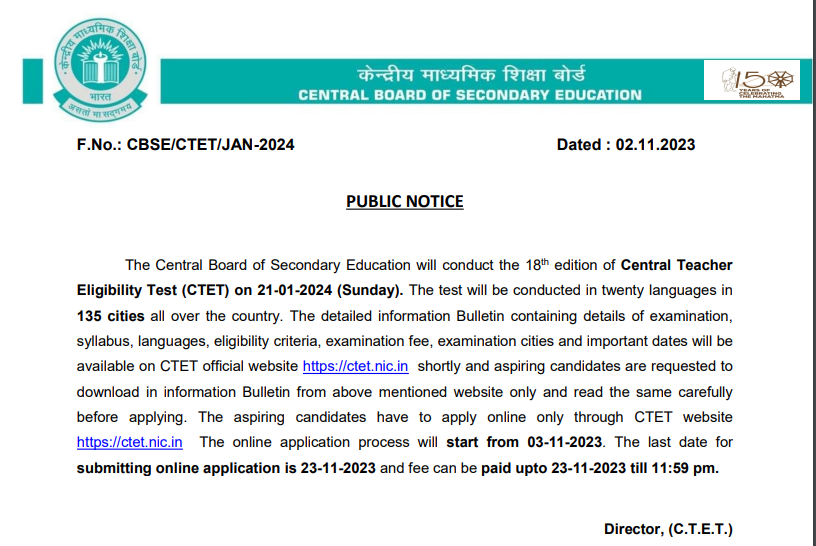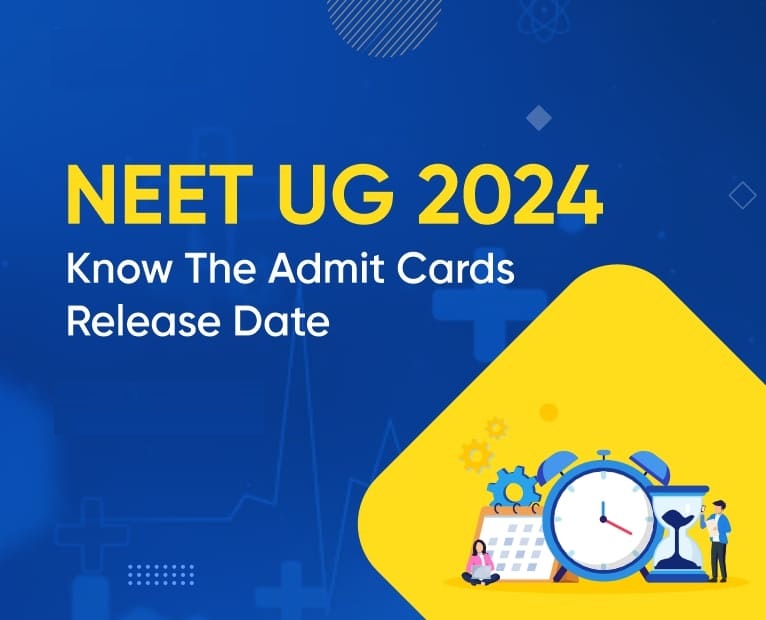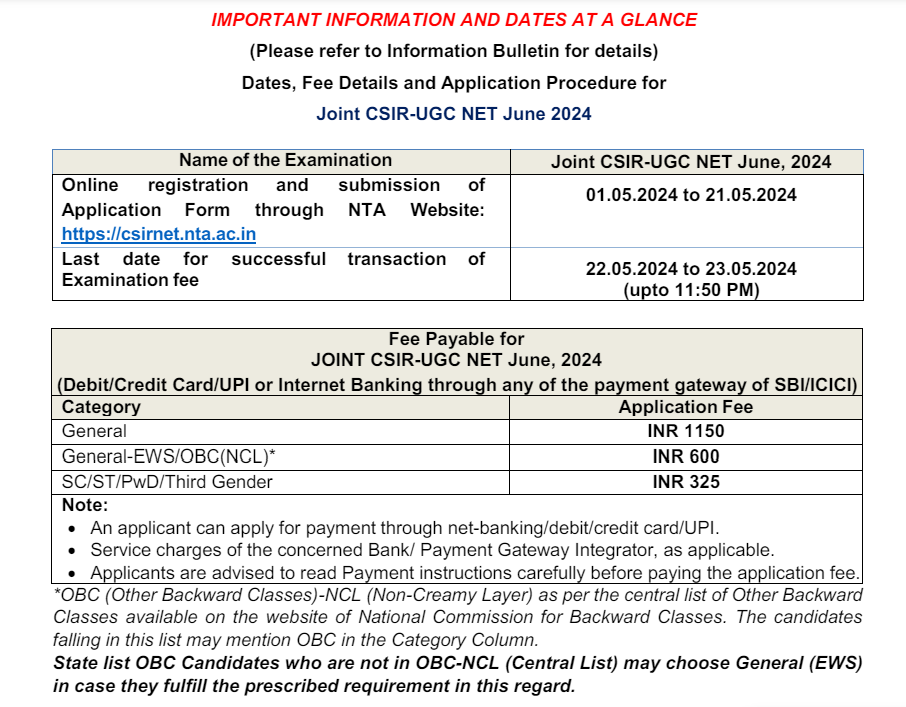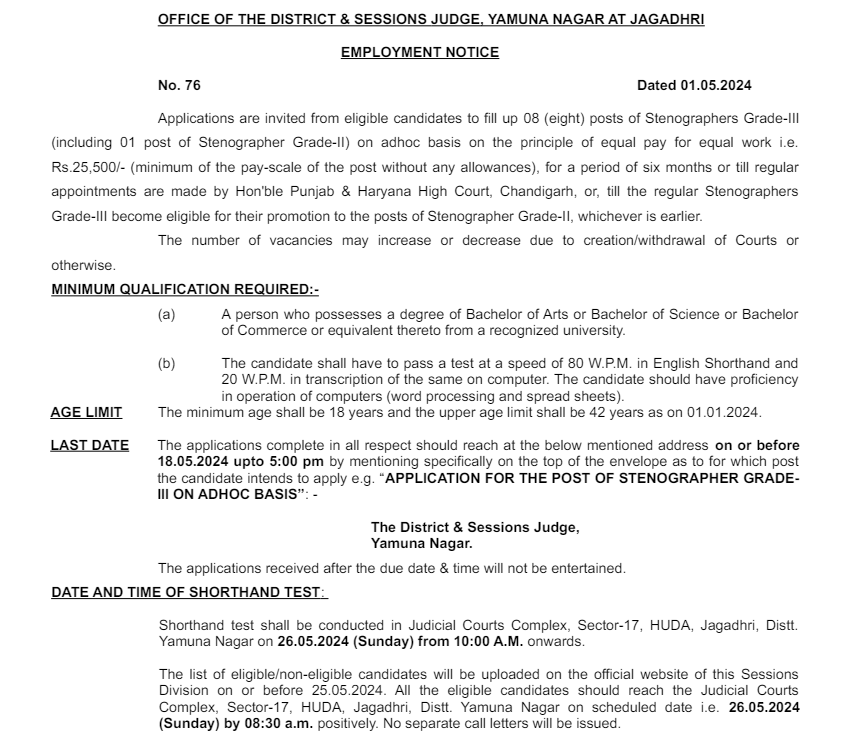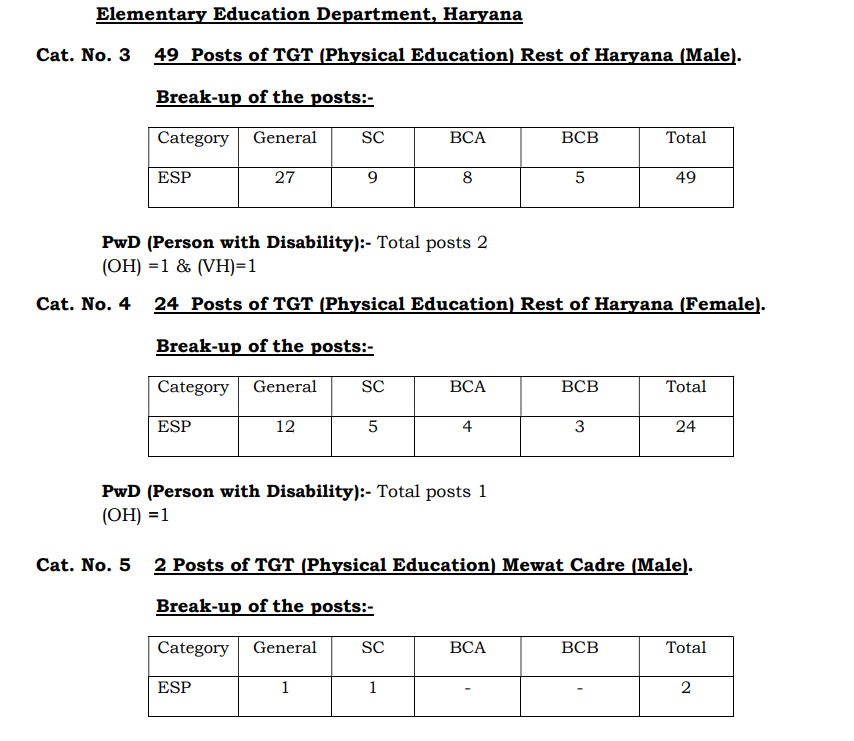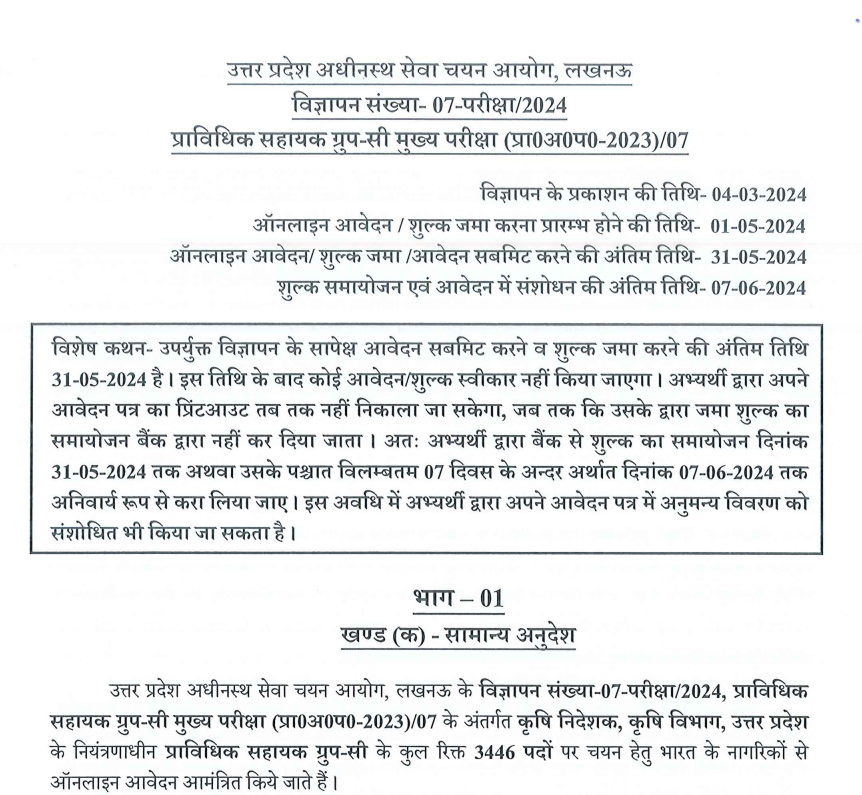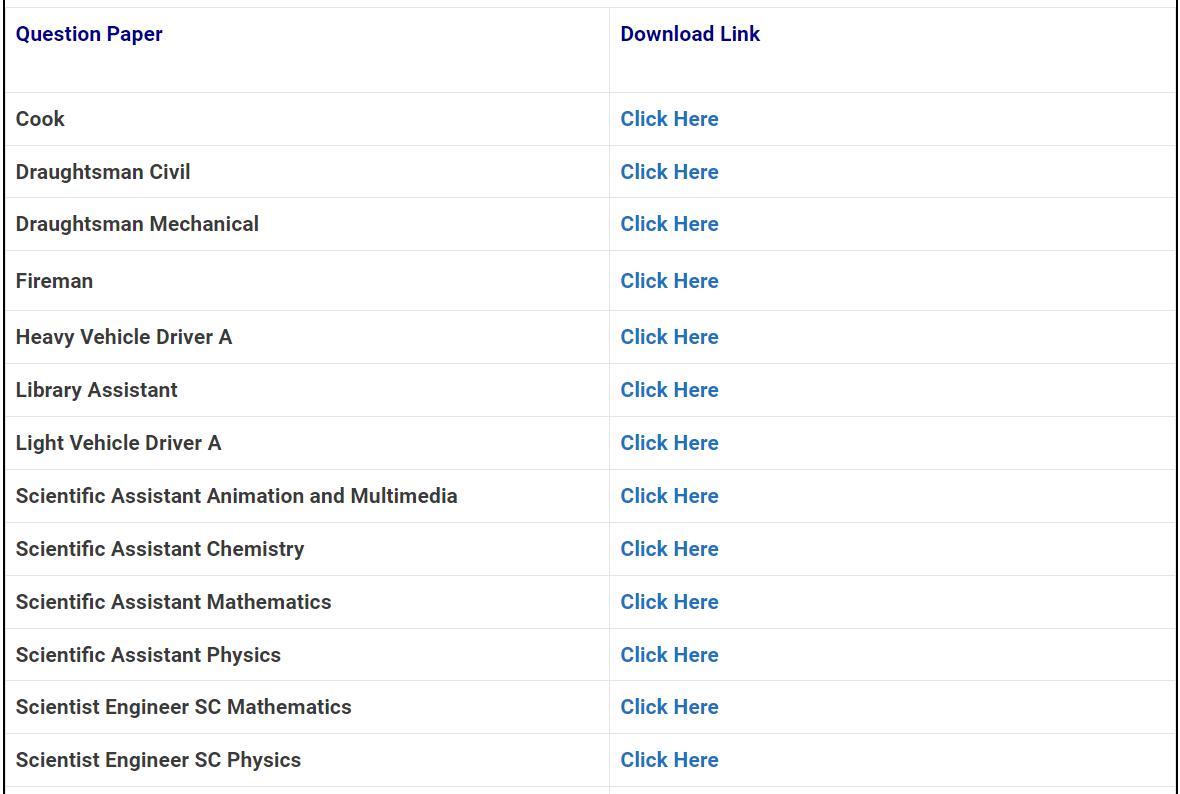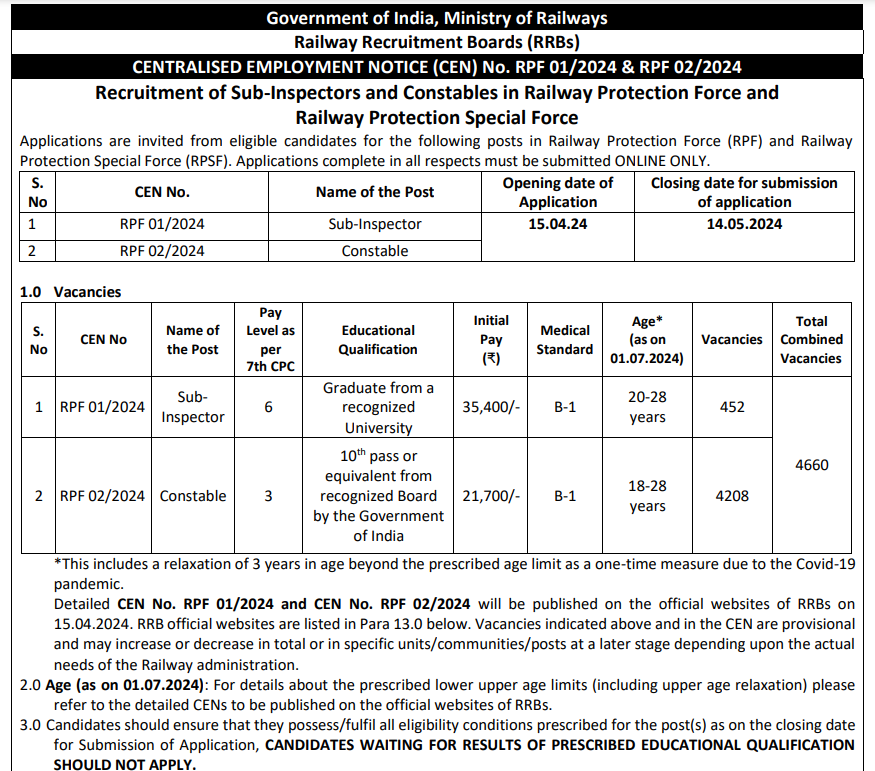CTET Syllabus 2024 For Paper 1 And Paper 2 PDF Download
CTET Syllabus 2024 for Paper 1 and 2 has been released by CBSE. Download the CTET Syllabus 2024 for Paper 1 and Paper 2 PDFs from here. Check Subject Wise CTET 2024 Syllabus here.
CTET Syllabus 2024: The Central Board of Secondary Education (CBSE) has released the CTET Syllabus 2024 along with the CTET 2024 Notification. The Central Teacher Eligibility Test (CTET) is a national-level exam conducted by CBSE for recruiting teachers in government-aided and unaided schools. The CBSE start online form from November 3, 2023, and last date to apply is November 23, 2023. The deadline to submit the fee is November 23, 2023. The CBSE will conduct the CTET 2024 Exam on January 21, 2024.
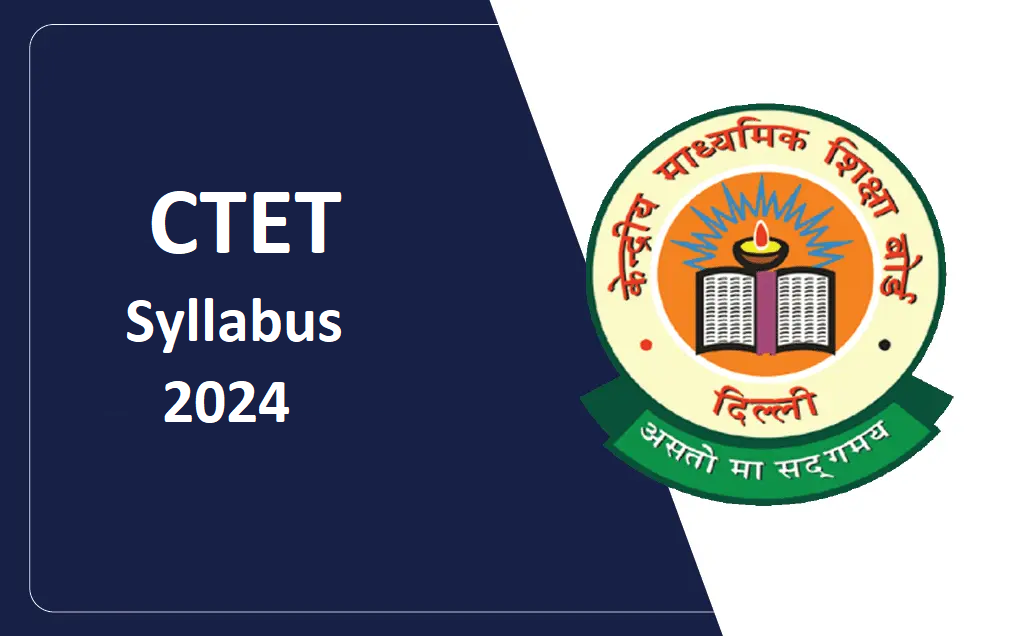
CTET Syllabus 2024
Candidates preparing for the upcoming CTET exam on January 21, 2024, should now download the official syllabus for Paper I and Paper II. The syllabus, which is based on the NCERT textbooks for classes 1 to 5, emphasizes pedagogical understanding and applications. The CTET syllabus 2024 is available in PDF format and can be accessed through the official CTET 2024 Notification.
- Paper 1 covers Child Development and Pedagogy, Language I, Language II, Mathematics, and Environmental Studies.
- Paper 2 covers Child Development and Pedagogy, Language I, Language II, Mathematics/Science, or Social Studies.
CTET Syllabus 2024 Overview
The candidates can check the key highlights related to CTET January Overview from the table given below:
| CTET Syllabus 2024 Overview | |
| Particulars | Details |
| Conducting Body | Central Board of Secondary Education (CBSE) |
| Exam Name | CTET 2024 January |
| Post Category | CTET Syllabus 2024 |
| Status | Released |
| CTET Exam Date 2024 | 21 January 2024 |
| CTET Exam Mode | Offline |
| Duration of CTET Exam | 2.5 hours (for each paper) |
| Type Of Questions | Multiple-Choice Questions (MCQs |
| Maximum Marks | 150 marks (for each paper) |
| Negative Marking | No Negative Marking |
| Official Website | ctet.nic.in |
CTET Syllabus 2024 PDF Download
The CTET 2024 exam is scheduled for January 21, 2024. Candidates are advised to download the official syllabus for Paper I and Paper II as soon as possible. The CTET Syllabus 2024 is based on the NCERT textbooks. The CTET Syllabus 2024 has been divided into two papers.
- CTET Paper 1: The focus will be on the prescribed syllabus of NCERT for classes 1st to 5, but the difficulty level and standard of the questions could be up to the secondary stage.
- CTET Paper 2: Will be based on the prescribed syllabus of NCERT for classes 6 to 8, with the difficulty level and standard of the questions potentially reaching up to the senior secondary stage.
CTET Syllabus 2024 PDF Download
CTET Syllabus 2024 in Hindi
The Central Teacher Eligibility Test (CTET) syllabus in Hindi can be downloaded from the CTET website. For primary-level teachers, the CTET Syllabus 2024 PDF includes topics such as Child Development and Pedagogy, Language I and II, Mathematics, Environmental Studies, and Social Studies/Social Science. The curriculum for upper primary level teachers includes Mathematics and Science, Social Science, and Language I and II. Candidates can use the CTET Syllabus 2024 PDF as a study guide for the CTET exam by downloading it.
CTET Paper 1 Syllabus
The CTET Paper 1 Syllabus for the Primary Stage of the CTET exam includes Child Development and Pedagogy, Language I & II, Mathematics, and Environmental Studies.
| CTET Paper 1 Syllabus | ||
| Subjects/Sections | Syllabus | Number of Questions |
| Child Development and Pedagogy | (a) Child Development (Primary School Child)
|
15 |
(b) Concept of Inclusive education and understanding children with special needs
|
5 | |
(c) Learning and Pedagogy
|
10 | |
| Language I | (a) Language Comprehension Reading unseen passages – two passages, one prose or drama and one poem with questions on comprehension, inference, grammar and verbal ability (Prose passage may be literary, scientific, narrative or discursive) |
15 |
(b) Pedagogy of Language Development
|
15 | |
| Language II | (a) Comprehension: Two unseen prose passages (discursive or literary or narrative or scientific) with questions on comprehension, grammar and verbal ability. | 15 |
(b) Pedagogy of Language Development
|
15 | |
| Mathematics | (a) Content
|
15 |
(b) Pedagogical issues
|
15 | |
| Environmental Studies | 15 | |
(b) Pedagogical Issues
|
||
CTET Syllabus 2024 for Paper 2
The CTET 2024 Paper 2 Exam consists of six subjects, which differ slightly as students advance to class VI. Candidates preparing to take CTET Paper 2 must carefully review the CTET Syllabus 2024 for Paper 2 for the Elementary Stage. The CTET 2024 Syllabus includes the following subjects/topic
| CTET Paper 2 Syllabus | ||
| Subjects/Sections | Syllabus | Number of Questions |
| Child Development and Pedagogy | (a) Child Development (Elementary School Child)
|
15 |
(b) Concept of Inclusive education and understanding children with special needs
|
5 | |
(c) Learning and Pedagogy
|
10 | |
| Language I | (a) Language Comprehension: Reading unseen passages – two passages, one prose or drama and one poem with questions on comprehension, inference, grammar and verbal ability. | 15 |
(b)Pedagogy of Language Development
|
15 | |
| Language II | (a) Comprehension: Two unseen prose passages (discursive or literary or narrative or scientific) with questions on comprehension, grammar and verbal ability | 15 |
(b) Pedagogy of Language Development
|
15 | |
| Mathematics | (a) Content
|
20 |
(b) Pedagogical issues
|
10 | |
| Science | (a) Content
|
20 |
(b) Pedagogical issues
|
10 | |
| Social Studies/Social Sciences |
|
|
Study Material Based on CTET Syllabus 2024
Candidates who wants to clear CTET should utilize the right study material, as it is essential for their selection. To ensure thorough preparation, students should focus on acquiring appropriate material aligned with the CTET 2024 Syllabus. Standard CTET Books and CTET Previous Year Question Papers serve as valuable resources that can significantly contribute to their success.
Creating concise notes from the standard books will facilitate better revision, enabling candidates to effectively retain important information. Additionally, attempting real-time bound mock tests is crucial as it allows them to evaluate their preparation level and identify areas for improvement. By actively engaging with these study materials and participating in mock tests, candidates can enhance their readiness and elevate their chances of success in the CTET examination.
Importance of CTET Syllabus 2024
The CTET Syllabus 2024 it is important for candidates preparing for the CTET 2024 Exam. It outlines the topics and concepts that candidates must study and master to pass the test successfully. By understanding the CTET Syllabus 2024 thoroughly, candidates can improve their exam scores and develop the necessary knowledge and skills to become effective teachers. Therefore, it is essential for candidates to prepare according to the CTET syllabus 2024, as it significantly enhances their chances of success in the exam and their teaching careers.
CTET Syllabus Languages
The CTET Exam offers 20 language options for candidates to choose from. When filling out the CTET Application Form 2024, candidates can select any language as their Language 1 and Language 2.
| CTET Syllabus Languages | |
| English | Hindi |
| Sanskrit | Punjabi |
| Urdu | Bangla |
| Manipuri | Tamil |
| Marathi | Mizo |
| Nepali | Oriya |
| Khasi | Malayalam |
| Telugu | Tibetan |
| Garo | Assamese |
| Gujarati | Kannada |
CTET Syllabus 2024 Key Points
CTET Exam Pattern 2024 and CTET Syllabus are crucial for CTET-qualified those candidates who wants to participate in the recruitment process for prestigious Government schools like Kendriya Vidyalaya, Jawahar Navodaya Vidyalaya, and other government or private teaching positions. To shine in the exam, candidates must carefully consider the following key points:
- The exam format consists of objective-type questions.
- Candidates earn one mark for each correct answer, with no marks deducted for incorrect responses.
- The CTET Paper 1 Syllabus is based on the NCERT curriculum for classes 1st to 5th.
- In contrast, the CTET Paper 2 syllabus is based on the NCERT curriculum for classes 6th to 8th.
By following these guidelines and dedicating consistent effort, you can effectively prepare for the CTET 2024 exam and increase your chances of achieving a remarkable score. Remember, success in the CTET will open doors to a fulfilling career as a teacher, shaping the minds of future generations.
Preparation Strategy to Cover the CTET Syllabus 2024
To crack the CTET 2024 Exam, candidates must follow a well-planned preparation strategy and divide their time according to their subjects. Let’s look at some subject-wise tips to ace the examination:
Create an Effective Study Plan
- Analyse your strengths and weaknesses to identify areas that need improvement.
- Dedicate more time to subjects where you need to improve your understanding.
- Cover the entire syllabus as required for the examination to ensure comprehensive preparation.
Child Development and Pedagogy
- Understand the concepts of physical, cognitive, emotional, and social development in children.
- Build a strong foundation by focusing on key areas of child development.
Mathematics
- Review essential mathematical concepts such as numbers, operations, geometry, and data handling.
- Allocate more time to subjects you find challenging to improve your understanding.
Language Skills (Language 1 and Language 2)
- Improve your grammar, vocabulary, and comprehension in both languages.
- Enhance your language proficiency through regular practice.
Environmental Studies
- Study the concepts of environmental studies, including the environment, natural resources, and their conservation.
- Develop a clear understanding of important topics through thorough study.
Make CTET Notes
- Identify significant topics from the CTET Syllabus 2024 and the previous year’s exams.
- Create detailed notes on these topics to serve as a valuable resource during revision.
Boost Your Confidence with Mock Tests
- Attempt numerous CTET Mock Tests to boost your confidence and gauge your performance.
- Familiarize yourself with the exam pattern and identify areas that need more attention through mock tests.
Prepare Thoroughly for Paper II
- Study all subjects thoroughly as you can expect in-depth questions from each of them.
- Be well-prepared across the board to ensure success in Paper II.
Analyze Previous Year Question Papers
- Review CTET Previous Year Question Papers to gain insights into topic weightage and the difficulty level of the exam.
- Tailor your preparation accordingly based on the analysis of previous year’s question papers.
Category: Click Here


